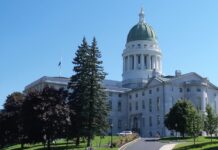On July 9, the news of the Boston Pride Board dissolving with no transfer of power sent shockwaves through the LGBTQ community. The board’s president, Linda DeMarco, had assured the community that a transition of power was to have happened.
Instead, the board—DeMarco, Malcolm Carey, Deborah Drew, Martha Plaza and Tina Rosado—decided to just shut the organization down.
Trans Resistance MA (TRM), an outspoken critic of the board’s transmisogyny and racism, was unsurprised. “Boston Pride made this decision instead of meeting with TQBIPOC community activists or listening to repeated community demands for the board to resign, transition leadership and create more inclusive bylaws,” TRM posted on their website.
But if Boston Pride had upheld its commitment, any corporate skeletons would have come out of the closet. Transparency about their revenues, beyond public annual tax returns, would shine a light on the organization’s bookkeeping records and on their president, where the buck stopped.
“I am committed to making the mistakes of the past right and doing the hard work to make sure all our community voices are heard. The hurt I feel right now with what is happening with Boston Pride motivates me to make sure the transformation moves forward.”
— Linda DeMarco
Changing of the guards?
In June 2020, the Boston Pride board hired Dorrington and Saunders consulting firm from Atlantic City to help them reckon with years of criticism, which a growing number in the LGBTQ community had come to see as having gone unanswered. This criticism was aimed toward getting Boston Pride to do a better job reflecting TQBIPOC people along with everyone else in the LGBTQ community. Dorrington and Saunders seemed like a good choice. Judah-Abijah Dorrington is a former co-chair of Black Pride New England, and both Dorrington and La Verne Saunders are longtime LGBTQIA+ activists.
In January 2021, DeMarco wrote an email to me, as a community leader, soliciting help.
“It would truly be an honor and privilege for us to have you help us in any way,” DeMarco wrote. “I believe in the Pride movement. I have been volunteering in the movement for over 23 years. I am committed to making the mistakes of the past right and doing the hard work to make sure all our community voices are heard. The hurt I feel right now with what is happening with Boston Pride motivates me to make sure the transformation moves forward.”
I agreed to help out by recommending community members as potential board member replacements and other volunteers.
Meanwhile, Dorrington and Saunders got to work. They developed a Diversity, Accessibility, Inclusion and Equity Strategic Plan to help the organization transform. While assessing the Boston Pride workplace culture, they conducted unconscious bias training with the board to help board members recognize structural inequalities, inequities and macroaggressions. They set up a transformation advisory committee (TAC) made up of community members to ensure the rebuilding of a new board. They advised the board to hold community-wide events to build trust and strengthen, repair and restore relationships among the public. One such example was the virtual Boston Pride Mayoral Forum, moderated by NBC 10 Boston’s Sue O’Connell in June.
Things appeared to be moving smoothly. The board had made it clear to Dorrington and Saunders that it would not change their bylaws but leave that to the new board. In a transfer of power designed to share more than 50 years of institutional knowledge, the board agreed to step down, turn over financial records, contacts and sponsors, and assist in a Pride Parade and Festival that would have taken place in September.
On June 2, Dorrington texted me, “We are not just transforming the Board but the culture that will support equity for QTBIPOC people.”
One June 10, Dorrington texted, “The statement to the community was due to come out today or tomorrow announcing Linda’s retirement and Board leaving. New board will start to come on next week and should be done in two weeks.”
But then, seemingly out of the blue, came the July 9 announcement.
Dorrington and Saunders learned the board would dissolve on the same day Boston’s LGBTQIA+ community got the news.
“I didn’t have anything to do with writing this announcement,” Dorrington stated. “This was the board. We and the TAC pushed them because they started dragging their feet again. We made it clear that until they were gone nothing could move. June was the deadline for them to be gone.”
Lee Santos Silva, a Black male of Cape Verdean descent and one of TAC’s members, expressed his displeasure with the board dissolving, too. “If the Board couldn’t commit to this level of work, I don’t understand why they didn’t just vacate their positions, leave Boston Pride intact, and let Dorrington and Saunders and TAC complete the transition.”
As the board’s date for its transfer of power was approaching, “the board informed TAC, through their consultants, that they were going to take 10 days to do some reflection and redirection. ‘Reflect and redirect’ is my language,” Silva said. “The board was strangely vague about what exactly they were going to do in this 10-day period.”
By June, TAC was having difficulties working with the board, Silva said. They had several concerns: the board’s commitment to depart, their ability to work collaboratively with TAC and to move toward consensus and their lack of transparency about opening their books to share financial information. Seeking clarification, TAC drafted a document and gave it to the board. “We expected the board to address these concerns and answer our questions during their 10-day hiatus.”
“Ten days later, I received a call from the board president thanking me for my work with TAC and informing me that the board had decided to dissolve Boston Pride,” Silva said. “About one hour later, the news appeared on the Boston Pride website and other online sites; about two to three hours later, it was on the evening news. So, we learned about Boston Pride’s dissolution at pretty much the exact same time that it was announced publicly.”
Many in the QTBIPOC communities felt from the onset that Boston Pride brought in the consulting firm Dorrington and Saunders as a diversion tactic. But the consulting team disagreed with that assessment. While it was a surprise to Dorrington and Saunders that Boston Pride threw in the towel, their commitment to the board was unwavering. “We believed that they deserved and were willing to take this opportunity to learn, take responsibility, and be held accountable and return the organization to its founding principles.”
So why did the board dissolve?
“The board informed TAC, through their consultants, that they were going to take 10 days to do some reflection and redirection. ‘Reflect and redirect’ is my language. The board was strangely vague about what exactly they were going to do in this 10-day period.”
— Lee Santos Silva
Follow the money trail
Had the board kept its promise to transition, the spotlight would have expanded from its focus on its systemic shortcomings around diversity and inclusion to include questions about the organization’s bookkeeping records.
As our community reels from the shock of Boston Pride disbanding, questions remain unanswered around the organization’s finances. According to a source who asked to remain anonymous at this time, when TAC had reached out to Malcolm Carey, the board’s treasurer, to see the books, they were told that DeMarco answers for the board. But DeMarco was not answering their questions either.
With pressure mounting to reveal financial records, the board lawyered up. Its members were instructed to keep quiet, and the questions remain unanswered.
As a shrewd businesswoman and business owner, DeMarco knows how to run both nonprofit and for-profit business organizations, and her reach is global. She sits on several local, national, and international boards. She’s the president of the Faneuil Hall Marketplace Merchants Association. In 2017, she became co-president of InterPride–an international organization composed of producers of Pride events for the LGBTQIA+ community.
One key question a source who asked to remain anonymous for now wanted to ask the board concerned DeMarco’s business trips to InterPride conferences and events with board members accompanying her on Boston Pride’s dime. How much did Boston Pride pay for these trips? As reported in Cause IQ, Boston Pride’s travel expenses in 2018 rose by 236 percent, with no records accounting for the increase. When three or four board members went to Athens, Greece for 2019 InterPride, what was the benefit to Boston’s LGBTQIA+ community?
In March, on a Zoom meeting with DeMarco and Dorrington about expanding their outreach to QTBIPOC communities in recruiting for TAC and new board members, DeMarco assured me that she was stepping down from Boston Pride’s board, but—she emphasized—she had fiduciary responsibilities to address first. Were these the same fiduciary responsibilities that led in part to the 10-day hiatus prior to the board’s reversal from turning over control (including their financial records) and dissolving the organization instead?
In September, I wrote DeMarco asking for an interview. I wanted to know her side of the story and expound on the fiduciary responsibilities she emphatically said she needed to address when we spoke in March. I also wanted to know how it could be appropriate that Boston Pride financed her and other board members’ trips to InterPride.
DeMarco declined to give me an interview but wrote the following in an email:
“It has been a difficult few months with closing down Boston Pride Office and all that goes along with closing down the organization. We did it for the betterment of our community and for the future of its leaders. While I appreciate your reaching out to me, I feel it is still too early to think about any type of story about what happened with Boston Pride and what is next, as that chapter has yet to be written. I will let you know when I would be available to talk about this.”
In mid-October, I wrote her again, asking about the working culture of the board, its resistance to a transfer of power, its unanimous decision to dissolve, its lack of transparency around finances and the organization’s teetering on the brink of bankruptcy. Again, she replied, “I am going to pass on an interview. As I mentioned before,” she added, “it has been a difficult time with closing down Boston Pride and all that goes along with it, but we did it for the betterment of our community and for the future of its leaders. We look forward to what the community is now going to do moving forward.”
This year, with the ongoing pandemic and at least 26 LGBTQ+ organizations having boycotted Boston Pride, its annual corporate and donor dollars have dwindled. It does not seem “too early” to understand what happened to this cherished, 50-plus-year-old community institution. It seems like the time is now.
“I often say that if you cannot get an institution to reform its oppressive structures, walk away from it and build the alternative.”
— Jo Trigilio
Where do we go from here?
“I often say that if you cannot get an institution to reform its oppressive structures, walk away from it and build the alternative,” said Jo Trigilio. “I would like to see a Pride organization that focuses on caring community, social justice, celebrating culture and uplifting those from BITQPOC communities instead of one that promotes corporations who are interested in capturing the monied LGBTQ market.”
Trigilio is a cofounder of Pride for the People (P4TP), a diverse coalition of BIPOC activists throughout Massachusetts. P4TP was founded when the Boston Pride communication team drafted a statement on George Floyd’s assassination in May 2020 that the Pride Board rejected. Trigilio, who was then on the communication team and helped write the message, immediately resigned and became one of the cofounders of P4TP.
With Boston Pride gone, the void is palpable. There is no set date when the community will see a parade, Boston Pride’s flagship event, that typically draws cheering spectators of nearly a million throughout New England and far overshadowing its early years with hecklers along a sparsely attended parade route.
For now, Trigilio tells me several activist organizations are collaboratively working on centering the voices and experiences of BITQPOC. A new and diverse Boston Pride Board is in the works to decenter corporate interests, understand the interactions of oppressions and embrace a democratic governance structure whereby the bylaws do not give absolute and exclusive power to the board.
With 51 years in the making, Boston Pride has played an integral part in highlighting our political movement of self-acceptance, broadening America’s understanding that a democratic society is diverse. As the nation is beginning to understand that BITQPOC Lives Matter, the new Boston Pride will, too.
Rev. Irene Monroe can be heard on the podcast and standing Boston Public Radio segment “All Rev’d Up” on WGBH (89.7 FM), the Boston affiliate of NPR. Monroe’s syndicated religion columns appear in Bay Windows, Cambridge Chronicle, Dig Boston, Curve and in several cities across the country and in the UK and Canada.
Not a subscriber? Sign up today for a free subscription to Boston Spirit magazine, New England’s premier LGBT magazine. We will send you a copy of Boston Spirit 6 times per year and we never sell/rent our subscriber information. Click HERE to sign up!









